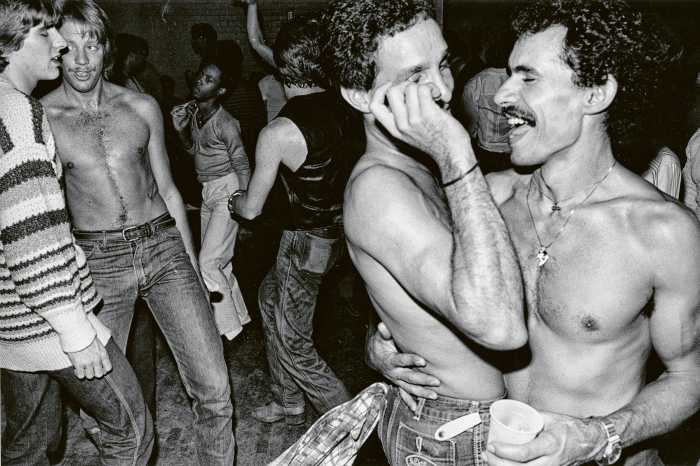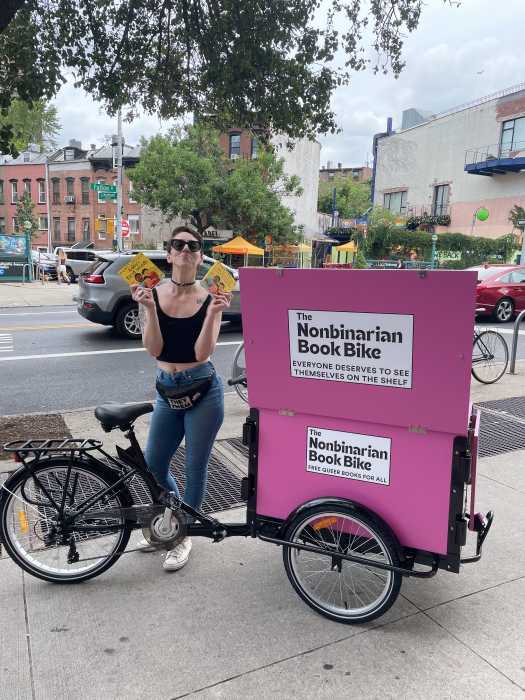Tremors sometimes caused Brad Lamm’s hands to shake all day long. The TV anchorman and newspaper columnist had become essentially immured in his life of crystal meth and booze –– to the point where his friends feared he would die. They intervened, convincing Lamm to check into rehab.
Seven years later, the long-time New Yorker’s life has completely turned around. First, he opened an intervention assistance practice to help families coping with addiction. Now, talk show superstar Oprah asks him for advice. Her protégé Dr. Mehmet Oz often invites him to appear as an expert guest on his show. This week, “How to Change Someone You Love,” his first book, arrives in bookstores across the country.
Lamm recently reflected on his career with Gay City News.
COURT STROUD: How did you become a consultant for Oprah Winfrey’s Harpo Productions?
BRAD LAMM: I got to know Oprah through my husband Scott [Sanders, producer of the musical “The Color Purple”]. She called to ask me to help with a personal friend of hers for her TV show. That started a dialogue about how I could tell some stories about a different kind of intervention with the Oprah audience.
CS: What’s unusual about your method?
BL: An invitational intervention is so different than the notion that you have to trap the person who is addicted. It starts with the idea that the people who love someone who needs help are uniquely poised to be the people who can do something. If you take the ambush out of the intervention, you’re left with a family meeting.
CS: Conventional wisdom says you can’t make another person change, yet that’s the basis of your entire practice.
BL: We’re all constantly changing and adapting. I’ve got a friend who just got a report that his triglycerides are way too high. He got a hand-written note from his doctor, written in red ink, saying, “You’re going to have a stroke and end up in a nursing home, with a person helping you eat, if you don’t make real change.” That’s the external imposition of change.
He got that letter three weeks ago, but hadn’t done anything. I started badgering him about his food: “What are you doing about this?” I called his two best girlfriends. We got together and said, “This isn’t a suggestion. This is serious. Here’s the name of a dietician. You have to do it. You owe it yourself and to us.”
CS: Love is a better motivator than fear, as you point out in the book.
BL: Isn’t that wild? My friend’s got a good relationship with his doctor. In fact, he’s been trying to get me to go to this doctor for years, but it was his friends who were able to turn that fear into action.
CS: What’s the difference between nagging and your method?
BL: Most people would say that they’ve tried to get someone to change. My experience is that they have probably have tried, but they haven’t tried this way. Having a group dynamic will keep the individual egos in check. If it’s not an ego-thing, it’s not a nag.
I have a friend right now, a gay guy whose partner is addicted. My friend thinks his love is enough. He’s cancelled two family meetings because they’re so enmeshed. He’s used to nagging. The boyfriend relapses and he nags. They have make-up sex. All is good in their world. And then inevitably, the active addict will pick up again. And the boyfriend threatens consequences and doesn’t follow through. It’s almost painful to watch someone languish that long. It’s been a year. He just sent me an email. I suggested another family meeting. He’s so resistant to it.
CS: How do you know when you’ve overstepped the line between helping and controlling?
BL: I had a family two years ago that really wanted to make their kid straight, so you have to review the rationale… Listen, if you want help getting your husband to put the toilet lid down, you don’t need a group intervention. If someone you love is struggling with a behaviour that is hurting them, cutting their life short, inhibiting their ability to have a good life, why not? It’s only fear that holds us back.
CS: At the start of the book, you describe your chemical dependency struggles, but don’t explain why you became an addiction recovery specialist.
BL: I think it’s a bit of my DNA. My dad’s a Quaker minister. I grew up in a home where we invited every addicted, crazy, depressed, struggling stranger or friend into the house — to shower, to live, to fill up their gas tank. Had I not been gay, it’s likely I would have ended up in some type of service in the church. Knowing I was gay at an early age, I threw that out. That dream or drive became re-imagined when I became clean and sober.
CS: Maybe you had to go through your struggles to get where you are now.
BL: I had become incredibly addicted to the alcohol, cocaine, crystal, and cigarettes. Those behaviours were so enmeshed in me that, if I hadn’t got clean and sober, I’d be dead. We wouldn’t even be talking about career options. Oprah said there’s the story of the guy who brings out charts and his book and the physics of climbing down the well, and then there’s the person who’s actually been in the well who says, “Hey, let me show you how it’s done.” I’ve known both the despair of addiction and the freedom of being clean and sober.
The odds are not great for 12-Steppers. Only about 15 percent of the people who enter into a 12-Step program will find relief. I don’t think there’s just one way.
CS: Isn’t that a different message than you get from most 12-Step programs?
BL: I send a lot of people to Al-Anon, but it tells people that they’re powerless to stop the behaviour of another person, when I know that friends and family hold unmatched power. There’s nobody better to help someone break through the denial. Addicts don’t have the moment of clarity. They decide to trust their loved ones who are asking them to do something different.
CS: Does your message have any special relevance for the LGBTQ community?
BL: There’s such a crisis in the gay community with alcohol and drug abuse. There’re such parallels between us and the Jews, post-Holocaust. AIDS decimated the community. The Jews had each other. We’ve never had the structure that other groups have had. Our gathering place was under the disco ball, not at Shabbat. We didn’t have the structure to come together and help each other get through during tough times. We tended to drink and drug in bars.
CS: What’s the single most important message in your book?
BL: You can do together what you cannot do alone.
Complete Information:
HOW TO CHANGE SOMEONE YOU LOVE
By Brad Lamm
St. Martin’s Press
$24.99; 276 pages
































